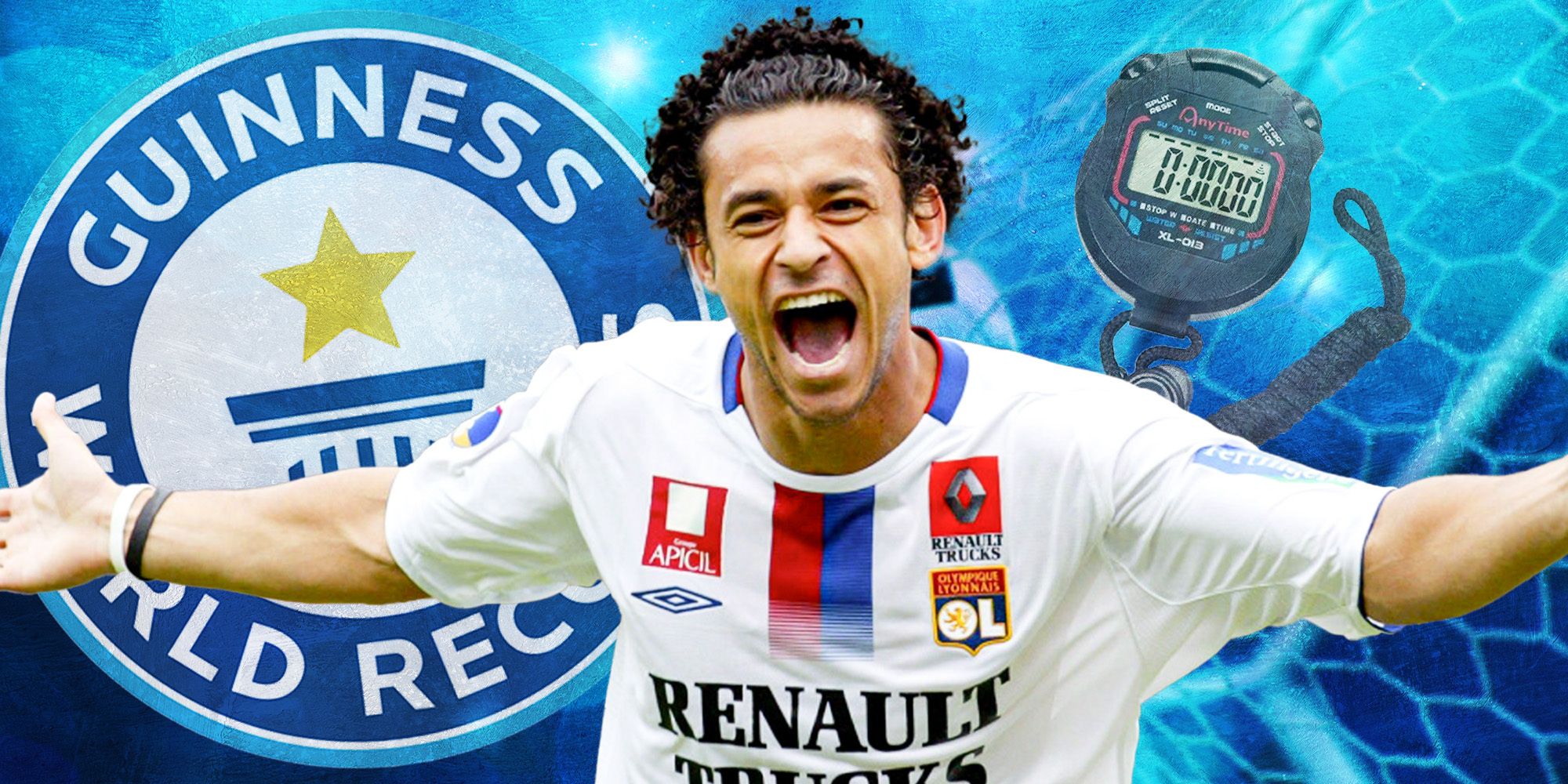
The Blazing Bullet: Unraveling the Fastest Goals in Football History
Football, the beautiful game, is a tapestry woven with moments of breathtaking skill, strategic genius, and heart-stopping drama. Among its myriad wonders, few phenomena captivate the imagination quite like the lightning-fast goal. A sudden, audacious strike from kick-off, an opportunistic interception, or a perfectly timed long-range shot – these moments defy expectation, sending shockwaves through stadiums and leaving opponents bewildered. They are not merely goals; they are statements, often setting the tone for an entire match and etching themselves into the annals of sporting lore.
The pursuit of the "fastest goal ever" is an ongoing quest, fraught with complexities. Unlike track and field where timing is precise and standardized, football’s record-keeping is often fragmented, especially when venturing beyond the elite professional leagues. Different leagues, varying levels of competition (amateur vs. professional), and the evolution of video technology mean that definitively declaring a single, undisputed champion remains a subject of lively debate. This article delves into the most prominent contenders for this elusive title, explores the mechanics behind these blink-and-you’ll-miss-it strikes, and examines the challenges in verifying such ephemeral moments.
The Elusive World Record Holders: A Race Against the Clock
When discussing the absolute fastest goals, several names frequently emerge, often accompanied by fractions of a second that underscore the sheer improbability of their feats.
Nawaf Al-Abed (Saudi Arabia): The Most Cited Professional Record
Perhaps the most widely recognized contender for the fastest goal in professional football history belongs to Saudi Arabian midfielder Nawaf Al-Abed. On November 7, 2009, while playing for Al-Hilal in a Prince Faisal bin Fahad Cup match against Al-Shoulla, Al-Abed unleashed a powerful shot directly from the kick-off. The ball sailed over the outstretched arms of the opposing goalkeeper and into the net, reportedly just 2.4 seconds after the whistle blew.
This goal, scored in an official cup competition, gained significant international attention and is often cited by Guinness World Records as the fastest ever in a professional match. Its immediate nature – a direct shot from the center circle – epitomizes the audacity required for such a record. Al-Abed’s teammates, clearly aware of the tactic, pushed forward in support, but the strike was all his own, a moment of pure, unadulterated brilliance.
Marc Burrows (England): The Enduring Non-League Legend
Before Al-Abed’s strike, the record was widely attributed to English non-league player Marc Burrows. On April 3, 2004, playing for Cowes Sports against Eastleigh in the FA Vase, Burrows scored an equally incredible goal in an estimated 2.56 seconds. What makes Burrows’ goal particularly famous is the sheer audacity and the conditions. A strong wind was blowing directly down the pitch, and Burrows, from the kick-off, lobbed the ball over the entire Eastleigh team, including their goalkeeper, and into the net.
While Cowes Sports is a semi-professional club, the FA Vase is a national competition for clubs below the professional tiers. The goal’s precise timing was confirmed by the referee and a sports reporter present at the game. For years, this goal was the benchmark, a testament to how even at lower levels, moments of pure magic can unfold. The debate often centers on whether "non-league" qualifies as "professional" enough for the absolute record, but its place in history is undeniable.
Gavin Stokes (Scotland): The Scottish Bullet
More recently, in August 2017, Scottish footballer Gavin Stokes of Maryhill FC scored a goal against Clydebank in a West of Scotland Super League Premier Division match that was timed at an astonishing 2.1 seconds. Similar to Burrows and Al-Abed, Stokes scored directly from the kick-off. The speed of the goal was captured on video and widely circulated, prompting renewed discussion about the true fastest. Maryhill FC, while not a top-tier professional club, operates within a structured league system, adding another strong contender to the list.
Vuk Bakic (Serbia): A Modern Contender
In 2023, Serbian player Vuk Bakic of FK Kolubara made headlines with a goal timed at approximately 2.2 seconds against Radnik Surdulica. This goal, also from kick-off, further solidifies the trend of teams attempting direct shots from the center circle. The increasingly high-definition video footage available today allows for more precise timing, but it also highlights the difficulty in standardizing measurements across different eras and competitions.
These incredible feats showcase the raw power, precision, and opportunistic thinking that define the fastest goals. While Al-Abed’s record often holds the official professional crown, the stories of Burrows, Stokes, and Bakic remind us that brilliance knows no league boundaries.
Notable Records in Elite Professional Leagues and International Stages
Beyond the contenders for the absolute world record, several goals stand out for their incredible speed within specific elite leagues and international tournaments, demonstrating that even at the highest levels, the element of surprise can lead to immediate success.
Shane Long (Premier League, England): The Premier League’s Quickest
On April 23, 2019, Irish striker Shane Long etched his name into Premier League history by scoring the fastest goal in the competition’s 27-year history. Playing for Southampton against Watford, Long capitalized on a long ball forward from kick-off, dispossessing a defender and then coolly lobbing the ball over the onrushing goalkeeper Ben Foster. The goal was officially timed at 7.69 seconds, breaking the previous record of 9.82 seconds held by Ledley King since 2000. Long’s goal was a masterclass in anticipation and clinical finishing, showcasing how a quick start can unsettle even the most organized defenses.
Hakan Şükür (World Cup): The Fastest on the Grandest Stage
At the 2002 FIFA World Cup, Turkish legend Hakan Şükür scored the fastest goal in World Cup history. In the third-place play-off match against co-hosts South Korea, Şükür pounced on a defensive error just after kick-off, seizing possession and firing the ball past the Korean goalkeeper. The goal was officially timed at 10.8 seconds, a record that still stands today. This strike not only secured a place in the record books but also set the tone for Turkey’s memorable performance, earning them a bronze medal.
Christian Eriksen (International Friendly): A Quick Strike for Denmark
In a 2013 international friendly against England, Danish midfielder Christian Eriksen scored a goal after just 8 seconds. While not a competitive match, it showcased the ability of top-tier players to exploit any momentary lapse in concentration from the opposition right from the whistle.
These goals highlight that even when players are among the best in the world, the shock value of a quick strike can be devastating. They demonstrate that records aren’t just for obscure leagues; the elite too can be caught off guard.
The Mechanics and Psychology of a Lightning Goal
How do these incredibly fast goals happen? It’s often a confluence of factors:
-
The Kick-off Gambit: Many of the fastest goals originate directly from the kick-off. The strategy typically involves a long ball forward, often aimed at a quick striker or exploiting an advanced goalkeeper. The element of surprise is key; defenders and the goalkeeper are usually not fully in position or mentally prepared for an immediate, direct threat. Strong winds can also play a significant role, as seen in Marc Burrows’ famous goal, adding an unexpected boost to the ball’s trajectory.
-
Opportunistic Interceptions: As seen with Shane Long’s goal, sometimes a quick goal stems from an immediate high press. Forcing a defensive error in the opening seconds, often due to a poor pass or a moment of hesitation, allows a forward to pounce and capitalize before the opposition can regroup.
-
Defensive Lapses: The initial seconds of a game are often when players are still settling in. A momentary lapse in concentration, a miscommunication, or a positional error can be ruthlessly exploited by an alert opponent.
The psychological impact of a lightning goal is profound. For the scoring team, it’s an immediate morale boost, instilling confidence and often leading to an aggressive, dominant start. The opponents, on the other hand, are instantly demoralized, put on the back foot, and forced to chase the game from the outset. It can disrupt pre-match strategies, create panic, and place immense pressure on players who were still mentally preparing for a tight contest. Goalkeepers, in particular, often bear the brunt of these rapid strikes, as they are frequently caught out of position or off guard, with little to no time to react.
The Verification Challenge: Why Records Remain Contested
One of the biggest hurdles in definitively declaring the "fastest goal ever" is the lack of universal, standardized timing mechanisms across all levels of football.
- Varying Standards: Professional leagues often have sophisticated timing equipment, but amateur or lower-tier matches may rely on manual stopwatches or even estimates from officials.
- Video Evidence: While modern technology provides clearer video evidence, the exact moment the whistle blows to the exact moment the ball crosses the line can still be subject to interpretation and frame rates. Older goals often lack high-quality video, relying on eyewitness accounts.
- Official Recognition: Guinness World Records requires stringent verification processes, often necessitating official confirmation from governing bodies, which may not exist for all levels of play.
- Definition of "Professional": The line between amateur, semi-professional, and professional football can be blurry, leading to debates about whether a record set in one tier should count against another.
This fragmentation means that while many goals are cited as "fastest," there is rarely a single, universally accepted record that stands without caveats. Each new contender adds to the rich tapestry of football history, but also to the ongoing debate.
Conclusion: The Enduring Thrill of the Immediate Impact
The fastest goals in football history are more than just statistics; they are captivating narratives of audacity, skill, and sometimes, sheer luck. From Nawaf Al-Abed’s audacious strike from kick-off to Shane Long’s opportunistic Premier League record, these moments remind us of football’s unpredictable nature and its capacity for instant drama.
While the debate over the "true" fastest goal may never be definitively settled due to the complexities of verification across different eras and levels of play, the pursuit of such records continues to fascinate fans worldwide. These blazing bullets, whether they lead to victory or merely serve as a footnote in a larger defeat, leave an indelible mark. They stand as a testament to the fact that in football, every second counts, and that sometimes, the most memorable moments are those that explode into existence before you’ve even had a chance to blink. As the game evolves and technology advances, perhaps one day a truly undisputed champion will emerge, but until then, the stories of these lightning-fast goals will continue to inspire and amaze.


